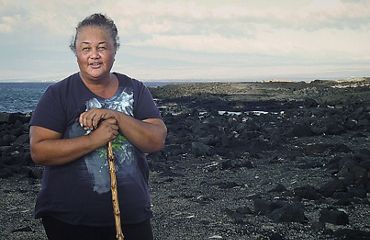Working with Partners to Restore Coastal Habitat
The actions we take today will impact the condition of Hawai'i’s reefs and fisheries…in our own lifetimes and long into the future.
TNC works at coastal sites and across ahupuaʻa, supporting community groups and government agencies to develop and implement robust restoration plans that bolster the resilience of marine environments and enhance coastal protection. The efforts utilize the latest tools and science, traditional knowledge and practices, and local expertise to foster culturally grounded, place-based management and to re-establish healthy mauka-makai connections. With strong community leadership, the support of volunteers, academic institutions and government partners, and a track record of successful results, the efforts have attracted over $20 million in federal funding from the Bipartisan Infrastructure Law and Inflation Reduction Act.
Quote: Leina‘ala “Aunty Lei” Lightner

We’ve been hearing from people that the area is starting to look like “old Hawai‘i.”
- At Ka'ūpūlehu and East Maui, we are working to build the resilience of the nearshore reefs that sustain Hawaiian culture, unique marine life and coastal communities.
- At Kīholo Preserve, we are restoring an ancient coastal fishpond—a traditional Hawaiian aquaculture system that provides for local food production, and absorbs sediments and nutrients, preventing them from flowing onto the reef.
- In Heʻeia, where partners are working to restore habitats and stream flows across an ahupua‘a, we provide scientific expertise to inform their efforts and help to restore traditional agriculture, including the lo‘i kalo (taro fields) that once dominated the wetlands, absorbing the sediments and nutrients that would otherwise flow onto Kāneʻohe Bay’s reefs.
- At Kawela on Molokai, we work with local, state, and federal partners to reduce upland erosion through improved ungulate management. In addition to healing an important watershed, the effort benefits native forest and shrublands, coastal reefs, and the people who depend on them. Watch a video to learn more.
- At Olowalu on Maui, we support a broad coalition working to reduce erosion through improved fire and ungulate management, to improve sediment capture systems, to strengthen reef management, and to identify coral species and locations for restoration to build the reef’s resilience.
- In South Kohala on Hawaiʻi Island, we are working with a coalition of public, private and community groups to build climate resilience across an area the size of Molokai to reduce stressors to nearshore reefs and fisheries.
Advancing Conservation Beyond These Places
Increasing evidence shows that these locally based collaborative efforts improve coastal and reef health and sustainability. Here in Hawaiʻi, they are also helping to perpetuate Hawaiian culture and increase local food security. That's why we also support dozens of community groups working to restore coral reefs, fisheries, Hawaiian fishponds and rare anchialine pools across the islands through local peer learning networks where members share knowledge, experiences and strategies to enhance their restoration and management and accelerate conservation along island coasts.
As the Ōlelo No‘eau reminds us, ʻAʻohe hana nui ke alu ‘ia. (No task is too big when done together by all.)
.jpg?crop=0%2C201%2C2016%2C1108&wid=1300&hei=715&scl=1.5507692307692307)